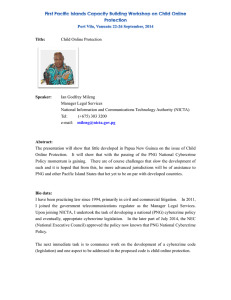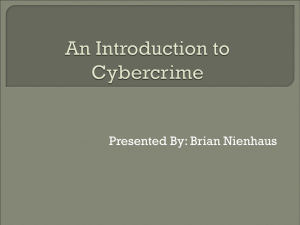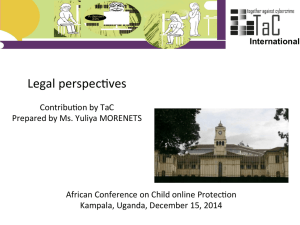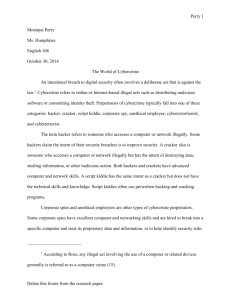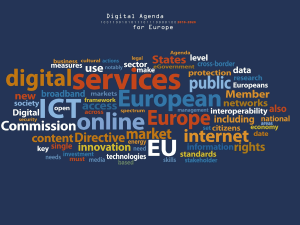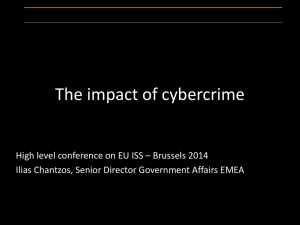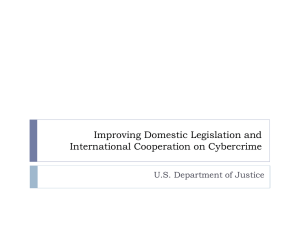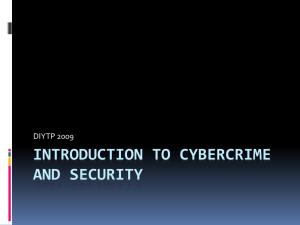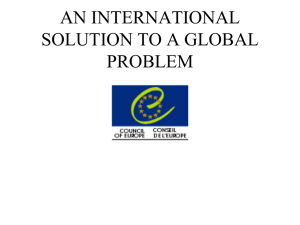Child Online Protection Port Villa, Vanuatu 22 – 24
advertisement
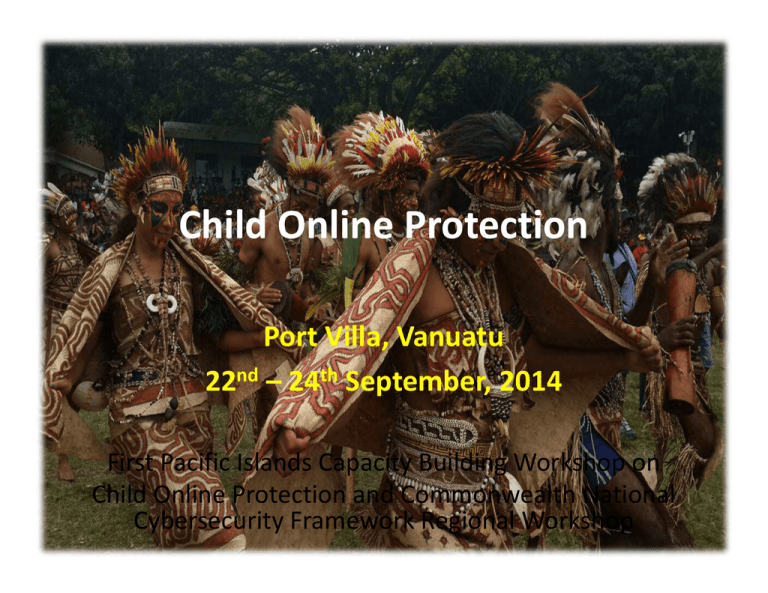
Child Online Protection Port Villa, Vanuatu 22nd – 24th September, 2014 First Pacific Islands Capacity Building Workshop on Child Online Protection and Commonwealth National Cybersecurity Framework Regional Workshop Population: (2014) about 8 million Mobile Penetration: About 34% (percent) PSTN Penetration: About 1.2% (percent) Broadband Penetration: About 1% (percent) 3 MNO [1‐3G (GSM), 1‐3G (CDMA), 1‐2.5G (GSM)] 1 Fixed Operator 6 Major ISPs Survey on cybercrime. Current legislation on child online protection. Government initiatives. National Cybercrime Policy of PNG. Next steps. Remarks from the Survey. End. Survey on cybercrime. In 2013 and as part of gauging views of the public while developing the National Cybercrime Policy, a nationwide survey was conducted. This ran for and ran for 3 weeks. However, feedback was mainly from the urban areas. The following were results concerning almost 200 children – (a) All were Students; (b) 5 to 20 years; (c) All had used computers, mobile phones or other such electronic devices or systems with access to the internet; (d) Most of them used it all the time; Cont… (e) Just over half of them know what cybercrime is; (f) And this was mostly through media; (g) About half of them experienced or knew someone who was a victim of cybercrime; (h) Examples include: viruses from internet sites or links etc., hate emails, bullying, propaganda etc., threats and intimidation etc., Obscenity, pornography etc., Scam messages, racism, discrimination, stereotyping, abusive language, hacking; (i) include the electronic Almost 100% of them said that PNG education curriculum should safe and responsible use of computers, mobile phones or other devices or systems with or without access to the internet Cont… (k) Most agreed that the earliest age for being taught in schools is 7 years; (l) All thought there was not enough awareness on cybercrime and that Government and other relevant authorities should do so; and (m) Almost all agreed that ISPs and other ICT service providers should have some responsibility in combating cybercrime. 1. Current legislation on child online protection. Criminal Code (Sexual Offences and Crimes Against Children) Act 2002. Amendments to protect children against child prostitution, child pornography and rape of children. Child means a person under the age of 18 years. Child pornography is defined in the Criminal Code to mean – (a) Any photographic, film, video, or other visual representation that shows a child or someone being depicted as a child engaged in or is depicted to engage in sexual activity etc; or (b) Any audio representation of a child who is or being represented as a child and who is engaged in or being represented as being engaged in sexual activity; or (c) Any written material, visual representation or audio representation that advocates, counsels or encourages sexual activity with children, irrespective of how or through what medium the representation has been produced, transmitted or conveyed and, without prejudice to the generality of the foregoing, includes any representation produced by or from computer graphics or by other electronic or mechanical means. Cont… Section 229K – Obtaining the services of a child prositutue. Section 229R – Children not to be used for pornographic purposes. Section 229S – Producing and Distributing child pornography. Section 229T – Possession of Child Pornography. Even though the amendments seek to cover all instances of child pornography, there are still loopholes in the law. For instance, the law criminalizes against those persons who produce and distribute child pornography materials and those that possess them but it does not criminalize those persons who may have watched it over live streaming etc. Given the lack of legal frameworks addressing child online protection, what is the Government doing about it? Government initiatives. ICB4PAC, 2011 – participated in developing the regional model policy and law for the Pacific on cybercrime and gained understanding on cybercrime. Formed National Taskforce on Cybercrime for policy and legislative development (2012). Developed National Policy on Cybercrime (2012‐2014). Conducted Workshop with relevant government stakeholders on cybercrime (2012). Conducted a nationwide public survey (2013). National Cybercrime Policy endorsed by Cabinet August 2014 Work on National Cybercrime Legislation to begin November 2014 Cont… On going review of the current Classification of Publication (Censorship) Act 1989 to repeal and replace it with a new Act (proposed Bill) to be known as Classification of Films, Publications and Online Services (Bill) 2014. The aims of the proposed Bill are – √ to ensure that the provision of broadcasting services uphold and maintain community standards; √ ensure broadcasting services maintain a high priority in protecting children from exposure to content that may be harmful to them; √ ensure that the provision of online services employ capable filtering systems or software; √ provide a standard for classification of publications, films, computer games and the prohibition of objectionable and unclassified publications, films, computer games. Cont… Ongoing discussions and reviews of draft notes on SIM card registration. Ongoing discussions and drafting of a concept paper to consider ISPs having, as a minimum requirement, employing 24 hour filtering systems/data base. National Cybercrime Policy of PNG. The area of focus under the Policy is for the development of a National Cybercrime Legislation. The Policy has outlined some areas of which the legislation should focus on but is not limited to such areas. Some of the areas mentioned by the children in the survey will also be catered for under this legislation. The Policy also provides for – Harmonization of National Cybercrime Legislation with other countries within the region and internationally for purposes of mutual assistance; Awareness raising on cybercrime to be conducted by Government and industry stakeholders; Cont… The Policy also provides for – Educational reforms to be undertaken by introducing subjects on cybercrime; Capacity Building: training of law enforcement agencies, judiciary and prosecution, and institutional & infrastructure development; Regional and International Cooperation; Review or enactment of legislation on electronic evidence; Establishment of a Cybercrime Investigative Unit and Forensic Lab; and Instances where liability of ICT Service Providers can be limited. Next steps. Develop legislation on Cybercrime (inclusive of child online protection) and review and update existing legislation already dealing with aspects of cybercrime. Continue awareness on Cybercrime in schools (targeting age groups: 7 to 16 years) with emphasis on being safe whilst using the internet. Conduct targeted training on Cybercrime. Capacity and infrastructure development. Remarks from the Survey. “Lately there has been a number of pornographic images posted by some PNGeans on Facebook, gossip pages that Facebook users go to bully, threaten etc other Facebook users and not only that but many more cybercrime…nowadays smart phones, tablets etc. have become affordable, children at an early age are exposed to the outside world.” “I believe that the Government should do some sort of awareness…especially to the children under the age of 10 or below 7. Because it is through them that you’ll succeed, because if you tell older people, they’ll have a reason to go against the government’s point of view. So its best you do awareness to little kids first.” “Facebook and texting have made many teenagers victims of cyber‐ bullying.” Cont… “Innocent young people have had their faces pasted onto pornography sites and are humiliated online etc.” “Glad that I am filling out this survey because it will help the country put a stop to cybercrime.” “The internet is very dangerous and a lot of children have access to mobile phones and internet” “…some people are children, cybercrime can spoil the mind of young people and make them do bad or nasty things that can affect their relationship with people.”
